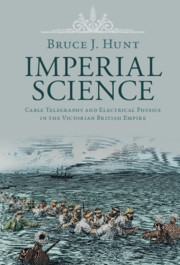Book contents
- Imperial Science
- Science in History
- Imperial Science
- Copyright page
- Contents
- Figures
- Acknowledgments
- Abbreviations
- Prologue: “An Imperial Science”
- 1 “An Ill-Understood Effect of Induction”
- 2 Wildman Whitehouse, William Thomson, and the First Atlantic Cable
- 3 Redeeming Failure
- 4 Units and Standards
- 5 The Ohm, the Speed of Light, and Maxwell’s Theory of the Electromagnetic Field
- 6 To Rule the Waves
- Epilogue Full Circle
- Bibliography
- Index
6 - To Rule the Waves
Britain’s Cable Empire and the Making of “Maxwell’s Equations”
Published online by Cambridge University Press: 11 December 2020
- Imperial Science
- Science in History
- Imperial Science
- Copyright page
- Contents
- Figures
- Acknowledgments
- Abbreviations
- Prologue: “An Imperial Science”
- 1 “An Ill-Understood Effect of Induction”
- 2 Wildman Whitehouse, William Thomson, and the First Atlantic Cable
- 3 Redeeming Failure
- 4 Units and Standards
- 5 The Ohm, the Speed of Light, and Maxwell’s Theory of the Electromagnetic Field
- 6 To Rule the Waves
- Epilogue Full Circle
- Bibliography
- Index
Summary
After the failures of 1858 and 1865, the Atlantic was finally spanned by a submarine cable in 1866. A boom in cable laying ensued as British firms built a global cable network would remain a bulwark of British imperial and commercial power well into the twentieth century. The surging cable industry created a demand for electrical knowledge that stimulated the emergence of physics teaching laboratories in Britain. These laboratories turned out scientists, engineers, and teachers trained in precision electrical measurement—essentially cable testing room techniques. The cable enterprise also set the direction of British electrical research in the late nineteenth century, including the reception and articulation of Maxwell’s field theory. In the early 1880s a circle of young “Maxwellians” emerged in Britain, among them Oliver Heaviside, a former cable engineer who had taken up Maxwell’s theory as a tool to address signalling problems. Guided by ideas about energy flow and signal propagation, in 1884 Heaviside recast the long list of equations Maxwell had given in his Treatise into the compact set now universally known as “Maxwell’s equations.” The form of Maxwell’s field theory that passed into textbooks in the 1890s was rooted in important ways in the global cable network.
Keywords
- Type
- Chapter
- Information
- Imperial ScienceCable Telegraphy and Electrical Physics in the Victorian British Empire, pp. 216 - 271Publisher: Cambridge University PressPrint publication year: 2021
- 1
- Cited by

